Interview with Andréa Burns
Andréa Burns is considered a Broadway veteran by members of the New York theatre community. After beginning her professional career at the age of eighteen playing Maria in West Side Story in some of Europe’s most famous opera houses, she landed a string of stateside national tours, regional theatre roles, and off-Broadway credits including Stephen Sondheim’s Saturday Night and Jason Robert Brown’s Songs for the New World. She appeared in the Broadway productions of Beauty and the Beast, The Full Monty, and The Ritz. In the last decade she has emerged as one the most recognized Latina performers on Broadway, originating the roles of Carmen in The Nance (alongside Nathan Lane), Daniela in Lin-Manuel Miranda’s pre-Hamilton hit In the Heights, and currently the role of Gloria Fajardo (Gloria Estefan’s mother) in the Broadway musical On Your Feet, which follows the lives and careers of Gloria and Emilio Estefan. Burns recently received an Outer Critics Circle Award nomination for her performance as Fajardo and a special mention from New York Times theatre critic Ben Brantley. She previously received a drama desk award for her ensemble work in In the Heights. Born in Miami and raised in a bi-cultural home (Her father is Jewish American and her mother is from Venezuela), from a very early age she dreamed of appearing on Broadway.
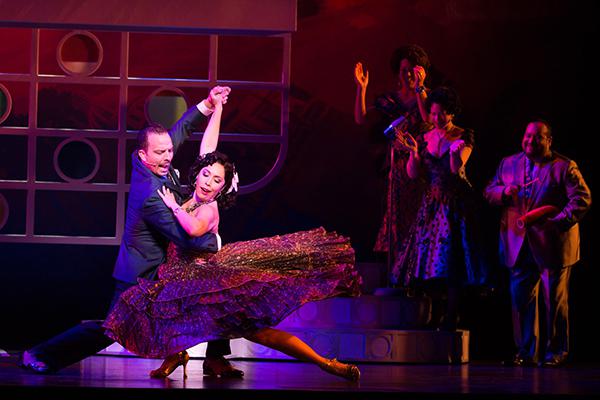
It was an incredible joy and a homecoming to all the Latin actors and musicians to be able to come to work and be the authentic version of ourselves. To be able to emulate our home life. We had a responsibility.
Gregory Ramos: In the Heights and On Your Feet are two big Broadway shows that have provided a lot of roles for Latino performers and have changed the landscape of Broadway. What is the work environment like with Latino creators and casts?
Andréa Burns: I think the best and most exciting thing about shows like this is—we are seeing shows written for Latins by Latins. In the Heights was thrilling to be a part of because it opened a door for the (historically) white and Jewish theatre-going public of New York to see real Latina/o people. We all have a great affection for West Side Story, myself included, but those roles come from Shakespeare. They’re also roles very tied to concepts of violence. In the Heights invited you into the world without being afraid of us, without assuming you were going to meet the street version of us. In fact, you were meeting the street version of us, there just happens to be a nonviolent street version that hadn’t yet been portrayed. Lin-Manuel Miranda said, “I just wanted to write a musical where I could play a Puerto Rican and not have a knife in my hand.” It’s a valentine to the neighborhood and the people he grew up with. In the Heights opened the door so we could get a peak into what it is to be Latino in New York, and through universal themes: family, tradition, love, and the immigrant question we ask, “Where is home?” But there were some reviews that said, “I can’t believe a neighborhood in Washington Heights and no drug deals are going on.” Even now, just seven years later, nobody would be caught saying that in a review. But seven years ago reviewers said they didn’t buy it. But Lin showed us that it is possible.
It was an incredible joy and a homecoming to all the Latin actors and musicians to be able to come to work and be the authentic version of ourselves. To be able to emulate our home life. We had a responsibility. And now On Your Feet has swung the door wide open—with the help of a worldwide icon (Gloria Estefan) who says “I’m Latin and you trust me. This is my family life. Come on in, I’m holding the door wide open for you.” And for all of Gloria’s great hits in the show that audiences know and love, some of the numbers they respond to the most are the truly authentic Latin numbers, like “Que Sigue La Tradición” and “Cuba Libre.” Doesn’t matter what culture you’re looking at. When you see people standing in their truth, you respond.
Gregory: I want to come back to family and representations of women in those two pieces. How do you locate yourself as an actor when you are playing these roles? What about your process?
Andréa: Well, I wish I had a fantastic Meryl Streep research crafted process to share with you, but basically growing up in Miami in a bi-cultural town—this happens to most of us who grow up stateside with Spanish speaking parents and relatives—we’re young enough to absorb both cultures at once. We’re very much American, we don’t have Spanish accents, and yet we’re surrounded by accents, we can flip into Spanish, but we have the “free pass” of being of the “American world.” Daniela, my character in In the Heights, is very much based on the hairstylist that my mother used to take me to in Miami, along with one I used to go to here in New York. The portrayals are really valentines to people I saw around me when I was a kid who were these amazing characters.
Gregory: Did you see the material before you went in?
Andréa: Nothing. I was originally brought in for In the Heights for two days, for the reading of the first act. And it began with Lin doing that rap that he starts the show with. I had never heard anything so fresh and so clever. And then everyone else started reading their parts and then…I realized I was in a very urban show. I grew up in suburban Miami. It was not the streets of New York or the Nuyorican experience. As people were approaching the material I started thinking, Oh my goodness. I don’t know if I fit. But I knew the character Daniela was a hair stylist, and I saw her first couple of lines and she looked funny to me on the page. I started to sweat, and think, Ooh, I think I’m going to be hitting this with a full-on very thick Spanish accent, and I hope this isn’t offensive. Because I’ve been able to walk both lines. I’d done a lot of non-Latin roles—this is a Latin moment, a Latin decade for me, and now of course, I’m known as a Latina performer. But to be in a room full of urban Latinos, I got very nervous. But I said, “Well, here goes nothing.” I said my first line in Daniela’s Spanish accent: “Vanessa, do you think everyday is a holiday? Get in here!” And the whole room broke up laughing. They were recognizing who she is. And then with every line it just got to be more joyful, and Lin immediately said, “Oh, my God. This is it.” And he kept giving me more to do. But I fell in love with her and so did Lin and the possibility of what she could be.
The show was just a joyful experience. It was magical for us. After a while at work we started saying, “You know, this isn’t even a job. It’s a ‘party con pay.’” That’s what we started to call working on In the Heights. And it’s extended to On Your Feet, a “party con pay.” Everyone’s aware of the great privilege to be in a show like this, that we all get to be in it, as opposed to being that one Latin in the show. Being in a Latin cast is extraordinary also because as an actor in New York City, being a Latin you’re kind of an outsider, but if you’re an actor in a Latin community you’re also kind of an outsider, because friends and family don’t usually understand our work. Unless you’re a mainstream star like Gloria Estefan. Celebrity means something. But being a theatre actor? You know, Latinos don’t really have a history of being a typical “Broadway audience.” This is changing now.
These Latina roles that I’ve had the privilege to play are women who wouldn’t consider anything otherwise. They are strong, they don’t apologize for it, they speak their mind, they are always right!
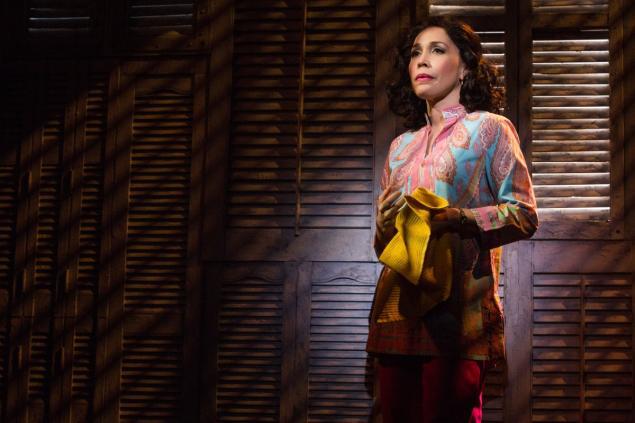
Gregory: Can you talk a little bit about the role you are playing now in On Your Feet?
Andréa: Gloria Fajardo, as she is written in the piece, has no problem expressing what she means. She’s a woman who has had to sacrifice so much. She is trying to do the right thing to protect her daughter. Here’s what I’ll say about the role, and I want to tie this in to when I went to see Chita Rivera in The Visit. I saw her and I went backstage and got to talk to her and I said, “You know for all the magnificent things you are, you’re such a woman on stage.” I feel like in the United States of America, we’re not interested in women. All I see are overgrown girls. And I mean, Chita is eighty. And there she was on the stage, as a woman. She was sexual, she was grounded, she was tough, she was vulnerable…but she was standing so proudly in her womanhood. It made me feel so inspired to do what I do on stage. And these Latina roles that I’ve had the privilege to play are women who wouldn’t consider anything otherwise. They are strong, they don’t apologize for it, they speak their mind, they are always right!
Gregory: Do you think about the influence of strong women in your life as you do the work in the role of Gloria Fajardo?
Andréa: Yes! People say, “It’s incredible, how did you find your way into the role of this Latin mother?” Well, I have a Latin mother. There are plenty of things, instincts I see in Gloria Fajardo that come from my own mother. I understand—I know where my mom came from. My mom also sang. And there was no way her father was ever going to let her do that as a career. So my mom is a big influence. And of course I spent a lot time with Gloria Estefan talking about her experiences with her mom, and then watching videos of Gloria Fajardo herself.
Gregory: The physicality of the character seems a central part of your performance. Can you talk about that?
Andréa: That’s important to me—I’m so glad you noticed that. I wish I could say, “Oh, I pick this and that.” But it’s really all about what I feel. When something is beautiful written, then you can trust it. I love when I’m able to truly trust that the groundwork has been laid, which is kind of a character flaw of mine, because sometimes I don’t go until I trust, which is a problem. I don’t feel like my approach to acting is very technical at all. When I go, I mean, I really go, but first I have to really trust the writing and the director—and directors that I’ve worked with will tell you that I can be difficult that way—but when I know I can trust, I go head first, and I don’t come out. It’s a sensorial experience for me; the eyes that I look into, the music, the dress I’m wearing, that feeling.
Gregory: You’re on Broadway again, you’re doing your solo show at 54 Below, teaching at the Stella Adler Conservatory, and recording albums. How do you feel as someone who people are looking at as a representative of the culture?
Andréa: Oh, my God. You’re saying that to me and I’m like, “Is that a thing? It’s great!” My Latin inheritance involves qualities I really admire about my mother and my relatives. I’m proud to represent that when it’s being depicted in that positive way. When I first came to New York, going out for roles, especially for television, I remember thinking they were roles that I was not comfortable that my mom would see me do. It’s different now. But I don’t feel the responsibility with pressure. I’m honored that anybody would think of me in that way. Because really, I’m just—thank God—a working actor who loves to do what she does and hopes to be doing it to the end of her days.



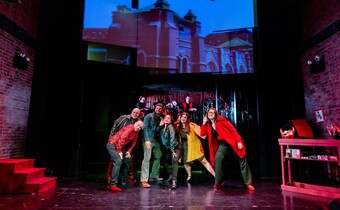


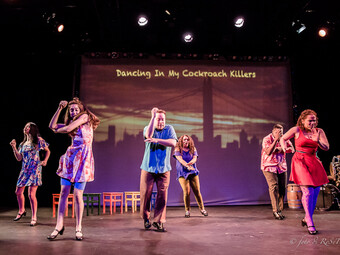

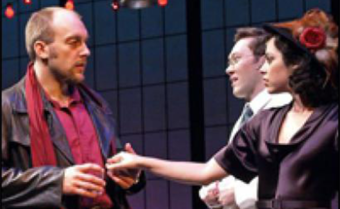


Comments
The article is just the start of the conversation—we want to know what you think about this subject, too! HowlRound is a space for knowledge-sharing, and we welcome spirited, thoughtful, and on-topic dialogue. Find our full comments policy here
She was wonderful in "In The Heights" I still haven't made it to "On Your Feet." I hope to make it sometime this autumn to see her!
Thanks for weighing in Justin! Yes, see her in the show, if you can, She's wonderful in it and the show if so full of life!
I've been fortunate enough to see Andrea Burns in both "In the Heights" and "On Your Feet." What's great about this interview is that it provides insight into the struggles of Latina/Latino actors in the theatre. Theatre artists come from so many varied backgrounds, but to get to learn more about one person's struggle, and not just about breaking stereotypes but also the power of unity when the entire cast is Latino, was an important aspect of the interview. Thank you for publishing!
Love this interview, Andrea is an inspiration! Important for all artists to read this.
I loved this interview, and I wish I got to see On Your Feet when I was in New York. I liked what Andrea said they are seeing shows written for Latins by Latins, basically meaning people get the real story from their point of view. Not just the violent side and doing drugs, they are real people. It’s refreshing having positive influence of Latins, and Andrea really tells it how it is that it’s just how they grew up. It was their families and the value of tradition, love, and just being their real selves. Those two shows just welcomed everybody into the world Latins know and to educate them and that we need Latin Broadway shows.
Thanks for chiming in, Amelia! So glad you liked the interview!
Excellent article. It is wonderful to see more positive representation of Latino/a's in theater. The interviewer did a wonderful job bringing Andrea's personal reflections about the role she is currently playing.
What a rich and inspiring interview! It was recommended to me and I'm so glad I read it.
Thanks for you comment, Emily. So glad you liked the interview! It was really fun to create it, and yes, she's so inspiring!
Excellent interview!!
What an endearing woman and inspiring way do work: "The portrayals are really valentines to people I saw around me when I was a kid who were these amazing characters." Me encantó leer esta entrevista, tu trabajo y pasión siga dándome animo desde lejos, amigo. Muy bien hecho Gregorio, la voy a compartir con unos amigos latinos que vive aqui en Denver :)
What an important, informative and timely interview! It is appropriate that Latino theatre and multicultural drama are finally gaining their proper due in the aftermath of important original Broadway shows like "In the Heights," "On Your Feet," and "Hamilton." There are so many performing arts talents like Andrea Burns out there who are capable not merely of bridging unproductive cultural divides, but also advancing an exciting new narrative in American civic culture that members of all races and backgrounds can grow and take pride from!
Love Andrea Burns. Great interview.
Very interesting interview with a remarkable performer!
What a fantastic interview, and what a brilliant way to share cultural experiences...insightful, thoughtful and so valuable! Thank you bringing Latina/o Theater into the conversation.
I love reading the answers to all of these questions- honest and colorful! It is so important to share the cultures and experiences we each have on and off stage. I will pass this on to my students to read. Thank you for this!
Great interview! I love being able to hear about the process of bringing these wonderful characters to life.
This in-depth interview is inspiring and hopeful. The voice of this important artist is should be shared with all theatre artists and especially aspriring theatre artists. We'll done
I am working with the author of a new play about a Chicana woman who has come up from the West Side of San Antonio to a position of power and influence in the city and is now running for Congress. (The play is "Adelita" by Mono Riojas Aguilar) This article gave me a vision of the journey that others have come. I am hoping that our play here will reflect the dignity of the people who tell our story and it will be seen as an expression of these universal and human concepts and transcend race - a human story that is about Hispanics. Andrea Burn's interview was insightful.
So glad you found the interview to support the work you're doing. Sending all good wishes for that project!
Excellent interview and wonderfully inspired and inspiring responses. I will have all of my students read this and respond to the questions and the answers.
Thanks, Dr. H! It was a great project and so important to mark the hopeful change of Latinas/os on Broadway.